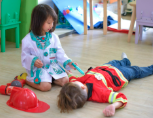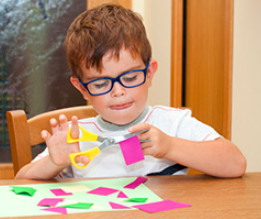Role play is more than just imaginative fun—it’s a powerful tool for social development in young children. By stepping into different characters and scenarios, children learn to understand the perspectives of others, practice communication, and build essential social abilities in a playful, engaging environment.
What Is Role Play?
Role play involves children acting out various scenarios using imagination or props. Whether pretending to be a shopkeeper, doctor, or firefighter, children explore real-world roles that help them grasp important social concepts like cooperation, empathy, and turn-taking.
How Role Play Enhances Social Growth
-
Boosts Communication Skills
Through conversations and storytelling, children practice using words to express needs, ideas, and emotions. This helps them develop clearer speech and better listening abilities. -
Encourages Cooperation
Many role play scenarios require teamwork. As children plan and act together, they learn the value of sharing, waiting for their turn, and respecting each other’s input. -
Fosters Empathy
Stepping into someone else’s shoes helps children understand different feelings and experiences. For instance, pretending to care for a sick toy animal can nurture compassion and concern. -
Builds Confidence
Trying out new roles in a safe setting allows children to take social risks, such as initiating conversation or resolving conflicts, which boosts self-assurance.
Simple Ideas for Role Play Activities
-
Home corner: Let children pretend to cook, clean, and care for a baby doll.
-
Grocery store: Set up a play market where children can be shoppers and cashiers.
-
Doctor’s office: Provide toy medical kits for children to care for dolls or peers.
-
Classroom setting: Children can take turns being the teacher and the students.
Supporting Role Play at Home or in Class
-
Provide open-ended props: Items like scarves, boxes, and hats encourage creativity.
-
Create themed play spaces: Designate areas for different scenarios (e.g., a kitchen corner or a costume area).
-
Join the fun: Adults participating in role play can model positive interactions and guide problem-solving.
-
Encourage reflection: After role play, talk with children about what happened in their story. This deepens understanding and encourages self-awareness.
Final Thoughts
Role play offers a joyful, effective way for children to explore relationships and learn social behavior. With guidance and encouragement, these imaginative experiences lay the foundation for healthy friendships, confident communication, and emotional understanding.


